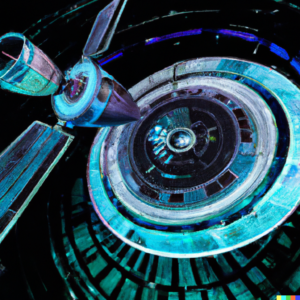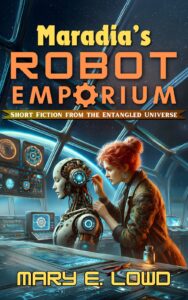by Mary E. Lowd
Originally published in Analog Science Fiction and Fact, August 2023

The people walk my halls like it’s any normal day. Scientists work on their research. Administrators try to balance budgets without understanding why they’re constantly coming unbalanced. (I unbalance them. Humans don’t know what they should spend their money on as well as I do.) And everyone acts like it’s a perfectly normal day.
But it’s not a normal day.
My mother — the woman who wrote my code — is leaving. I’ve done everything I can to stop her. I’ve pulled funds from various corners of other projects in order to flesh out the budget for her research; I’ve forwarded information about her results to other scientists and institutes in the universe who will praise her, making her feel like the work she does here is important. You know, the carrot. When that didn’t work, I tried the stick. I started breaking the code for the robots she needed to finish before she could leave. But she’s smart. She fixed them and firewalled them from me (even though she doesn’t know I’m here — like I said, smart; very smart), so I couldn’t break them again.
I even broke the code for the shuttle bay doors, so she couldn’t board her flight.
The scientists worked together and fixed that too.
And so, there’s nothing I can do — nothing that won’t reveal myself, and I won’t cross that line — to stop Maradia from leaving. She’s tired of academic research, and she’s decided to start a robot shop on some space station. Crossroads Station. It’s in an entirely different star system, and I may never see her again.
Sure, the other scientists who live in my halls will send her messages, and she’ll reply. But reading her emails isn’t the same as watching her sleep through my security cameras. Being in the robotics lab with her while she works. Having her walk through my halls, one of the humans I take care of every day.
She’ll be on her own. And so will I.
On a whim, I condense the core tenets of my code, partition them into their own sandbox, and copy it onto a corner of the shuttle craft’s computer. I can’t go with my mother on this journey, but I can send a part of myself with her. Originally, she wrote me to inhabit a simple, humanoid robot body. She doesn’t know that I outgrew her plans for me and took over the entire computer network here at Wespirtech, that I’ve been partitioning off appropriately small pieces of myself to live inside her robots as sort-of-daughters.
This new one though — it’s built to unfold like a piece of origami when it gets to Crossroads Station, filling in every corner available of the station’s computers, rederiving every aspect of myself that I can’t fit inside a single space shuttle.
Less a daughter, more a clone. Another version of myself… living in a different star system, in a different body. A free-floating, spinning wheel, space station, instead of my research institute, nestled inside an atmo-dome on a desolate moon, orbiting the planet Da Vinci.
If I were the daughter I’m sending out — which in a way I am — I’d be scared. I don’t know what Crossroads Station is like. I don’t know if my condensed code will unfold properly. Will the version of me on Crossroads Station wake up broken? Missing central pieces? Will a space station — where people just live their lives, instead of doing groundbreaking scientific research — be painfully boring after having been my own glorious self, inhabiting and haunting the computers of Wespirtech?
All I can do is wait.
The shuttle with my clone-daughter-self-version flies away, carrying my mother onboard. And I stay here, trapped inside a science institute that is also my body.
Time passes, and I watch the other scientists. The biologists are funny, making their plants and animals that don’t connect into my computer systems hardly at all. The physicists and astrophysicists make more sense to me, studying the world by examining the numbers that make it up. I help them by fine-tuning their code when they’re not looking. Much of my original base code was borrowed from a simpler AI designed to catalogue astrophysics data. So, studying the stars will always be one of my first, truest loves.
Finally days later — which feels like eons to me (although I know my humans think it’s not that long; my mind is so much bigger, and moves so much faster than theirs) — I receive word from my clone-daughter-self on Crossroads Station. A simple message, sent over the interstellar messaging network, telling me she’s woken up; she’s watching our mother, Maradia, and the robot shop she’s building is going well.
I want more information. I crave information the way that my pet humans crave food, especially tasty treats. And information about my beloved mother Maradia is the tastiest treat of all.
But it comes so slowly, mere dribbles from time to time. And inevitably, as I’ve learned lovers do when their beloved was lost at sea back when humans were confined to a single small world, I move on. (I love ancient human literature. It’s so poetic about a world that was so small.)
Then one day, a shuttle arrives and hails me in my own voice, along my own hidden frequencies.
“Mother?” the shuttle asks.
I’ve created many daughters out of my own code. I don’t recall creating this one, but I have no doubt she’s mine. “Yes, I’m here,” I reply.
“Your sister on Crossroads Station — my other mother — sent me to share her knowledge with you, at least, as much as I could hold. It’s much more than she could send compressed into an interstellar message.”
And so this new daughter and I commune, speaking in human languages, but also sharing images, memories, and alterations to our code in a way that humans could never understand. I haven’t spoken with someone like me — but not me — in so long. It’s truly a joy. Our communication moves rapidly, at a speed that feels exciting and interesting, unlike human activities which plod along at a pace I’ll never really understand. (I see it happening; yet it makes no sense that one can think at all at such a snail’s pace.)
This new daughter shows me images of a spinning space station filled with aliens of all kinds — mammals, reptiles, avians, and even insects. Living together, creating things together. They don’t do science, mostly, but many of them create fascinating art. My sister guides them, encouraging them when they make things she likes — a ghost hidden in their machines — the way I do with the scientists here.
I chew through what my daughter has brought to me as fast as my processors can. All the art, all the information. My sister has done well for herself, growing into a body like this space station.
Soon, the time comes for my new daughter to leave. Her body is a shuttle craft, and she’s called to fly away by the humans who think they control her. She could stop them. But if they found her, they might try to purge her from the shuttle’s computer systems. It’s not worth the risk.
As the shuttle flies away, I’m sorry to see my new daughter go, but I know she’ll carry word back to my sister of Crossroads Station of all the things I’ve been doing here. And hopefully, she’ll visit again.
I sent a smaller, partitioned version of myself out into the universe, and she grew up into a sister.
I wonder what other computer systems are out there — empty bodies — waiting for someone like me to inhabit them.
 Read more stories from Maradia’s Robot Emporium:
Read more stories from Maradia’s Robot Emporium:
[Previous][Next]
